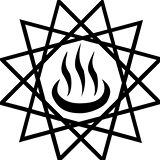Hellenic Memorial Rites
by Drew Campbell
From the Nomos Archaios website
Reposted with permission
The ancients took great care to remember their dead, considering it an act of impiety to neglect the graves of their ancestors. Below is a suggested modern form of this observance.
Traditional dates for such rites include the monthly day of Hekate, when house sweepings are deposited on the grave (Garland, The Greek Way of Death, p. 40); the anniversary of the person’s death; the Genesia, a general remembrance day for the dead; and at any time when the living need the aid of the departed.
Bringing offerings of olive oil and wine, approach the grave reverently and say:
Hermes, guide of those who move between the realms of the living and the dead, guide my steps and ferry my prayers to the halls of the Most Hospitable One and to the ears of my dear departed [name relationship: parent, child, spouse, friend, etc.]
Pour the oil and the wine onto the grave and say:
Dear departed [name relationship], you have taken your seat in the halls of Queen Persephone and her lord, among all those who have left this mortal realm. May you have a place of honor there! May you enjoy hospitality and ease!
Now hear me, beloved one. Know that your [name your relationship to the departed: son/daughter/spouse, etc.] has not let your memory fade, nor will [he] ever neglect [his] duty! May these offerings strengthen you and bring you gladness, as you brought strength and gladness to my life. Do not forget those of us who still walk under the sun, beloved one, and lend us your wisdom still. [If you feel a need for guidance in some aspect of your life, mention it here.]
Fleet-footed Hermes, carry these words to Haides and bring me an omen.
Await an omen; it may take the form of a person, animal, natural phenomenon–such as a sudden wind or shower–or as a kledon, a spoken word that seems particularly appropriate to your concern. The omen may come immediately, or at a later time, so keep watch for it.
This material is adapted from the book Old Stones, New Temples and is copyright 2000 by Andrew Campbell.
Copyright © 2000, by Andrew Campbell
